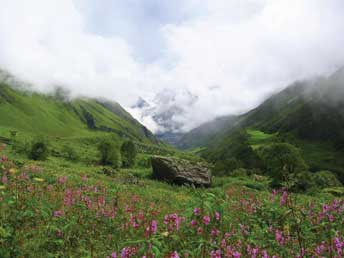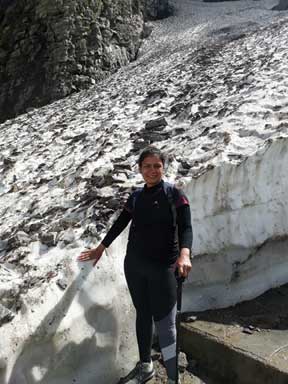Disha Jain
As I took another laboured step on the treacherous trail to the Valley of Flowers, the world’s highest National Park, I looked down at the misty Puspawati river surging through the brooding Himalayan ranges, amazed at how it gurgled over rocky boulders. The most fascinating experience about the trek to the Valley is the fact that you get to witness the journey of the Alaknanada river – the source of the holiest river in the country – the Ganga. Charting its path through the steep valleys and gorges, all the way from its Himalayan abode – Satopanth glacier – it allows different rivers at different gradients of its journey to subsume themselves into it, thus giving rise to the most sacred confluences of the country – the Panch Prayag.

As we travelled along the winding route in the mountains, parallel to the magnificent Alaknanada river, I was struck by an odd musing, about a starkly different context from Robert Frost’s poem, ‘The Road Not Taken’. Although the poet talks about a fork in the road that he encounters, I thought of the merging of the rivers as the coming together of two different routes that meet the same end eventually. Wasn’t that the whole point of the poem, that irrespective of the ‘road’ you choose, you end up trying equally hard?
Since my college days, I’ve found teaching very inspiring! This was the reason why it became my first career option after college – a choice not many people consider very competitive, or as competitive as other more conventional professions such as medicine or the civil services. Teaching gave me a sense of purpose that perhaps my parents could never understand back in those days, as they kept insisting that I would do better if I put the same amount of hard work for the civil services exam. It was as if your ability to study hard decided whether you were fit for IAS or not. That was all that mattered, even more than your aptitude.
After teaching for three years, and having settled in a new home post marriage, my husband and I started thinking about my choice of career, for a teacher working so hard was something he had not heard of. This was the time when the idea to give IAS a try came to mind when a family member cleared his IAS exam. The accolades he received and celebration that was organized in his honour for having cleared the most prestigious exam in the country left me truly amazed and pretty much in awe of everything that came with clearing the exam. That was when I started thinking seriously about the other ‘choice’ I could take,that ‘worn’ out path, in place of the road I had already walked upon.
After all the persuasion, and with my own sense of understanding, I decided to give UPSC a try. I was convinced that my ability to study hard, whether I was suitable for the profile or not, would help me ace the exam. As a matter of fact, I started envisioning my role as a diplomat as more of an extension of my identity as a teacher. I drew my inspiration from diplomats like the late Anita Kaul, who had done pioneering work in school education as an administrator, and played a key role in conceiving Right of Children to Free and Compulsory Education (RTE) Act-2009.
After almost two and a half years of trying excessively hard to clear the exam in solitude, and finally giving up the chase, partly due to my own yearning to get back to teaching, and partly due to the fact that I was no longer eligible to sit for the exam age wise, I could not help but ruminate about the ‘difference’ my two choices have made in my life. I was glad that I could take both roads at different points in my life – one that helped me become a teacher – a less travelled one, and the more coveted one, for which lakhs and lakhs of aspirants put their nose(s) to the grindstone to succeed, the road for which perhaps I didn’t have the aptitude.

As I stood amidst the calming and overwhelming natural beauty all around me, I wondered if there had been a similar celebration for what I had achieved as a teacher, would I still have a nagging urge to give UPSC a try? If society in general attached as much prestige to teaching as it did to other conventional professions, would there still be a need for a teacher like me to feel inadequate at the height of her career?
On my first Teacher’s Day, I was greeted with a very inspirational quote by Jeannette Walls from one of my students:
“The women I know with strong personalities, the ones who might have become generals or the heads of companies if they were men, become teachers. Teaching is a calling, too. And I’ve always thought that teachers in their way are holy – angles leading their flocks out of the darkness.”
Notwithstanding the gratitude that such a thoughtful gift made me feel, I couldn’t help noticing the gender bias. Also, the assumption that teachers are ‘holy’, that it is a social service that they do by imparting education, is something that takes away a sense of professionalism that we ought to attribute to teaching. Yes, it is a profession that contributes meaningfully to the society; it is a humane profession. But, unfortunately, it is considered a profession less in terms of status, quality training and professional autonomy; else many dedicated young people out there would be choosing teaching in a school as their first career option today.
In a strange way I began to see a sense of similarity between teaching and nature. It is only when you are in the lap of nature, surrounded by an unending chain of enormous mountains, a thick cover of trees and free flowing rivers, that you realize how much we owe our existence to them, and how much we have marginalized our discussion on nature in the wake of our fascination with technology and development. In my opinion, teaching – a profession that is so fundamental a component in the evolution of human society – suffers neglect and marginalization of the same kind, if not more, so much so that now it has been reduced to making children ‘memorize’, without even making them understand the concept or its relevance. Wouldn’t it be great if a geography teacher explains concepts such as ‘gorge’ or ‘tributary’ by showing some real pictures from the Indian geographic landscape, instead of relying on a single bland picture from a textbook? Despite my years of preparation for the civil services exam, I could never imagine clearly what ‘cirques’ looked like until I saw them with my own eyes during my trek.
This was my second trek in the third decade of my life. What if I had got this opportunity during my B.Ed days as part of my professional program? Wouldn’t experiences like these, where you give opportunities to teacher students to go on an expedition to the Himalayas or experience remote parts of the country to learn about diverse cultural and natural features, help them become more aware and experiential as teachers? Wouldn’t experiences like these allow them to take to their own classrooms, irrespective of the subject they teach, a hands-on experience of the importance of and the challenges faced by our environment today, not to mention the ways the local communities have adapted to mitigate them?
As I returned from the day-long trek to my room in a small hamlet called Ghagharia in the Bhyunder Valley, feeling tired yet joyful by the fact that I could see a very different world from the one we get to see only in the textbooks, I wondered if teachers are what Dr. Radhakrishnan (whose birthday is celebrated as Teacher’s Day in our country) described*, shouldn’t they deserve a more holistic and experiential educational program? An educational program that allows them to gather experiences and motivates them to continue to do so even while they are on the job, so that they can develop an interdisciplinary understanding of their subject? A program that challenges them to think objectively, beyond the system of textbooks and exams, so that they can become humane professionals, who believe in creating a culture of trust, compassion and kindness among children as much as we believe in getting good grades in today’s time.
*“Teachers should be the best minds in the country,” – Dr. Sarvepalli Radhakrishnan
The author is a teacher by profession and a learner at heart. She can be reached at disha.nanu@gmail.com.
